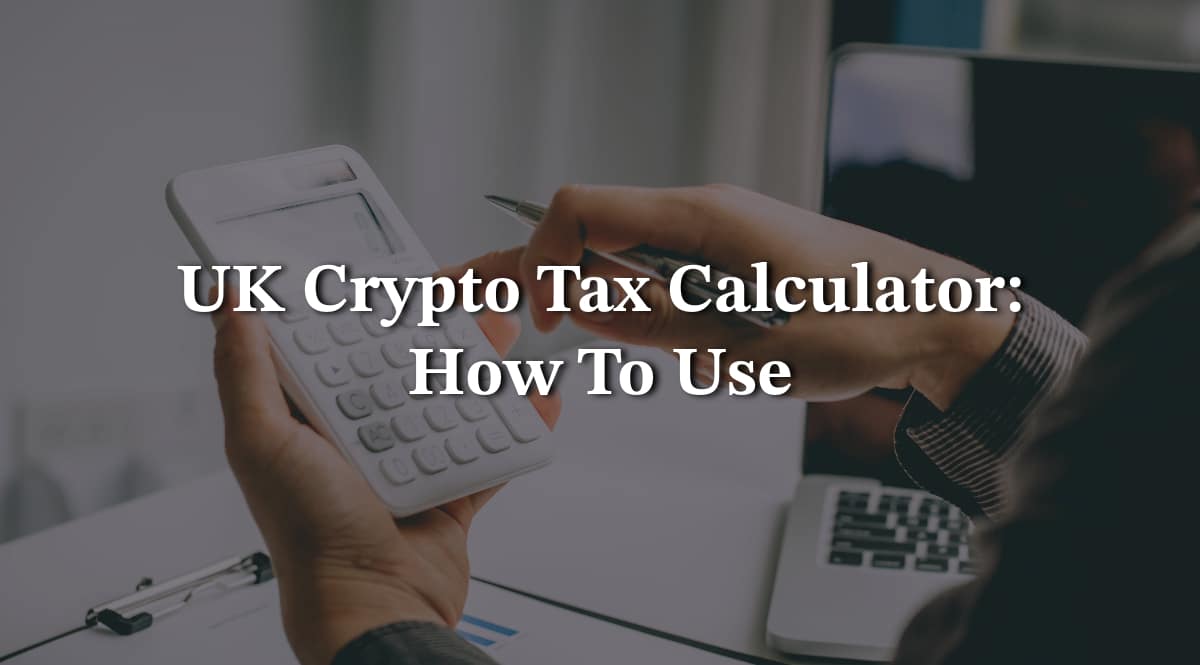
UK Crypto Tax Calculator: How to use
HMRC, the tax authority, was uncertain about how to handle crypto trading, mining, and similar activities for a considerable period. The lack of specific regulations regarding cryptocurrencies contributed to this uncertainty. However, as the popularity of these profits increased, HMRC had to address the issue. In March 2021, they released their initial guidebook on crypto assets, offering clear instructions on the tax obligations associated with various forms of crypto trading. This move was necessary as there is no such thing as free money. In this article, we help you to understand crypto taxation and how to use the UK crypto tax calculator.
UK Crypto Tax Calculator – How is cryptocurrency taxed?
The method of calculating taxes on cryptocurrency differs depending on the location. In the United Kingdom, cryptocurrency is treated as property and is subject to the same tax regulations as other assets. This includes following the rules for short- and long-term capital gains. The tax rates applied to cryptocurrency gains align with those on stock capital gains. It is crucial to accurately compute both gains and losses when determining cryptocurrency taxes, and a crypto tax calculator can assist in this process.
If you receive income through the exchange of coins and tokens, it is necessary to determine and pay the capital gains tax. In the case of earning money through staking or mining cryptocurrency, you will be responsible for paying Income Tax on these earnings, depending on your total annual income.
How to file your tax crypto to HMRC? You’ll report all your crypto as part of your Self Assessment Tax Return. You’ll report income from crypto in the Self Assessment Tax Return (SA100) and you’ll report any capital gains or losses from crypto in the Self Assessment: Capital Gains Summary (SA108).
Does the 30-day rule apply to crypto?

Unlike stocks, the wash sale rule doesn’t currently apply to crypto. This rule states that you aren’t allowed to claim a tax deduction if you sell a security at a loss and replace it with the same or a “substantially identical” security 30 days before or after the sale, according to the IRS.
UK Crypto Tax Calculator – What is a crypto tax calculator?
Crypto tax calculator represents a piece of software designed to help you calculate crypto income, profits and losses and adequate tax liabilities. Cryptocurrency taxes calculator integrates popular digital wallets, crypto exchanges and platforms to to make the process as easy as possible and accurate
When do I pay the tax I owe?
If you are a resident in the UK, your liability to pay tax in the UK on cryptocurrency profits will depend on your individual activities and circumstances. Generally, if you’re selling, gifting, or trading cryptocurrencies, you may incur capital gains tax (CGT). Similarly, if you receive cryptocurrency as an income, it may be subject to income tax.
Capital gains tax rates for Bitcoin
Like with other cryptocurrencies, the tax rate you’ll pay on Bitcoin all depends on whether you have capital gains or income, how much you earn and how long you’ve held your asset.
UK Crypto Tax Calculator – Crypto Taxing Example

John decides to invest €20,000 in Bitcoin at the start of year X. He is in the 30% marginal tax bracket, carries out a first crypto transaction by withdrawing his money in euros with a capital gain of €10,000 (i.e. €30,000). He does not know how taxation works and decides to reinvest everything in SHIBA and he suffers a loss of 50% of his investment (€15,000) but decides to keep his investment in a stablecoin.
At the time of the tax return during year X+1, he thinks he can declare a capital loss of €5,000. Only in the eyes of the tax authorities, there is only one capital gain transaction taken into account. Xavier will therefore have to pay €3,000 in tax on his capital gain under the Flat-Tax (30% x €10,000).
This is a very simple, even simplistic example, which illustrates the importance of being accompanied by a tax lawyer or by a platform like Waltio to avoid this kind of unpleasant surprise! Some investors find themselves having to pay more taxes than the amount of their portfolio!
How to calculate your capital gains and losses
Here’s a basic step-by-step guide to help you calculate crypto gains and losses:
Record Keeping
Ensure you have detailed records of all your cryptocurrency transactions. This includes dates, values in fiat currency (like USD, GBP, etc.) at the time of the transaction, the type of cryptocurrency, quantity, and the nature of the transaction (buy/sell/exchange/gift).
If you use multiple wallets or exchanges, consolidate your records to have a clear picture.
Determine Your Cost Basis

The cost basis is essentially how much you initially paid for the cryptocurrency, including fees or other acquisition costs.
If you bought 1 BTC for $10,000 and paid a $50 fee, your cost basis would be $10,050.
Determine Sale Value
This is the value of the cryptocurrency when you sell, trade, or otherwise dispose of it. Don’t forget to subtract any associated fees from this value.
If you sold the same 1 BTC later for $15,000 but had a $50 fee, your sale value would be $14,950.
Calculate Gain or Loss
Subtract the cost basis from the sale value.
Using the above example: $14,950 (sale value) – $10,050 (cost basis) = $4,900 gain.
Mining rewards, staking, airdrops
These might be considered as income at their fair market value when received and can later incur capital gains/losses when they are sold.
Aggregate All Transactions:
Sum up all the gains and losses from each transaction to get your total net gain or loss for the tax year.
The post UK Crypto Tax Calculator: How to use appeared first on FinanceBrokerage.

